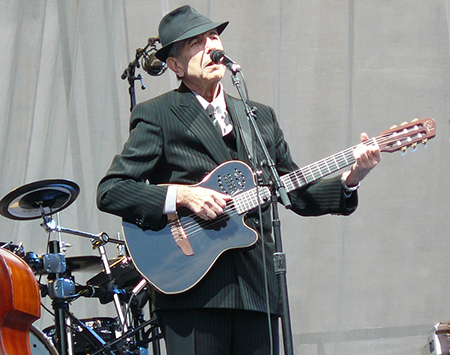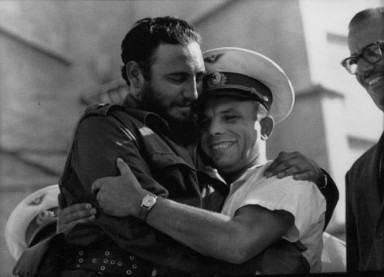 Leonard Cohen’s death reminded me of a gesture of fealty in a Paul Muldoon poem: ‘his songs have meant far more to me/than most of the so-called poems I’ve read’. As the tributes of the last week have demonstrated, Muldoon was not alone in this sense that Cohen’s songs have an urgent emotional depth. It’s an enviable capacity to resonate with listeners: these songs have become part of our emotional lives – the weather in which we walk – as much as Cohen’s.
Leonard Cohen’s death reminded me of a gesture of fealty in a Paul Muldoon poem: ‘his songs have meant far more to me/than most of the so-called poems I’ve read’. As the tributes of the last week have demonstrated, Muldoon was not alone in this sense that Cohen’s songs have an urgent emotional depth. It’s an enviable capacity to resonate with listeners: these songs have become part of our emotional lives – the weather in which we walk – as much as Cohen’s.
When ‘Famous Blue Raincoat’ closes with the densely personal line, ‘Sincerely L. Cohen’, we somehow don’t feel that it only applies to him. By disclosing this story of fractured relationships in the form of a letter to a rival, Cohen writes a script we can readily feel with. When he sings the bitter couplet ‘And you treated my woman to a flake of your life/And when she came back she was nobody’s wife’, we’re not given anything as crude as what happened. Instead we get just a ‘flake’, a fragment of other lives which we can magnify.
The title of the album from which this track comes is a useful reminder that Cohen wasn’t simply the melancholy bard of romantic failure; he wrote Songs of Love and Hate. Indeed, the title of the record poses the question of the gap between these apparently opposing emotions. Are there songs of love on the one side and songs of hate on the other, or are they more promiscuously mixed? In the case of ‘Famous Blue Raincoat’, it would be difficult to say which emotion dominates.
But it’s to a different sort of emotional friction I want to draw your attention. Throughout his work, Cohen specialized in troubled father-son relationships. His most famous song, ‘Hallelujah’, begins with the paternal relationship between the psalmist King David and the father God he pleases with his ‘secret chord’. Consider ‘Story of Isaac’, from Songs from a Room (1969). This is a pointed retelling of the story from Genesis. God instructs Abraham to sacrifice his only son Isaac. As his title suggests, Cohen’s sympathies are squarely with Isaac. We see Abraham through Isaac’s eyes as a crazy fanatic intent on doing ‘what I’ve been told’. The second half reinterprets the biblical narrative as a contemporary allegory, condemning those ‘who build these altars now/to sacrifice these children’, insisting ‘you must not do it anymore’. There’s a contrast with Bob Dylan’s ‘Highway 61 Revisited’, which includes a version of the same story. Dylan’s interest is on God as a psychopathic bully who compels Abraham to submit; Isaac is unnamed. What’s unusual about ‘Story of Isaac’ is that it shows Cohen lining up on the side of the young who were protesting against the Vietnam War and the old who were ‘sacrificing’ them.
Though such oppositional political gestures became rarer – later songs like ‘The Future’ anticipate coming events with apocalyptic zest rather than generational solidarity – the perspectival interest in how the powerless relate to the omnipotent remained constant in his work. In ‘Treaty’ from You Want it Darker (2016), released just before his death, Cohen returns to the relationship between the anguished believer and an inscrutable God. The song’s central conceit is that there is no reciprocity – no peace treaty – between the believer and the deity. One of its harshest couplets is the refrain ‘I’m so sorry for the ghost I made you be/Only one of us was real – and that was me.’ The first line seems to suggest that the speaker is in the process of atoning, but the second line pulls this prospect away by reinforcing the accusation that God is a ghost – only the speaker was real in this one-way conversation with an increasingly tenuous father figure.
Muldoon’s poem raises the relationship between poetry and song, a question extensively debated in recent weeks after the award of the Nobel Prize for Literature to Dylan. Like Muldoon, my impulse is to say that this is a false dichotomy. To quote another of Cohen’s songs of anguished paternity, ‘I’d like to pretend that my father was wrong,/but you don’t want to lie, not to the young’. This is exactly why Cohen’s songs continue to move within his listeners: because they don’t lie about the things that matter.





Rate and Review
Rate this video
Review this video
Log into OpenLearn to leave reviews and join in the conversation.
Video reviews